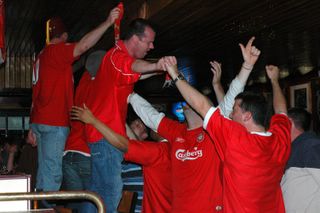Tell me nothing; I don't want to know.
There are two subspecies of humans: the rest of us, and the soccer fans (homo soccerfanus). The latter resemble the former in appearance; but they can be identified by occasional peculiar behaviors, such as extreme emotions after the victory or loss of their teams, shouting and yelling at critical moments in a game, excessive consumption of beer during a match event, and, sometimes, animosity and violence toward the fans of the opposing teams.
Yu Chen is one homo soccerfanus. He roots for Liverpool, which just won the European Champions League after a dramatic comeback against AC Milan. We watched the final game in Kezar’s pub. It was not a live broadcast, but every one of us arrived without knowing the outcome. That evasion, however, was futile, for as soon as we walked in the pub the result was obvious. A group of Liverpool fans, all dressed in the red uniform, were celebrating on top of the tables. Simultaneously happy and disappointed, Yu Chen sat down to witness Liverpool’s path to triumph.
It was a game of climax and drama. Each team played one half. AC Milan scored three goals in the first half. All hope seemed to have vanished for Liverpool, then miracle happened. In the second half, within a span of five minutes, Liverpool scored three goals. Eventually, Liverpool won in the penalty shootout.
Unfortunately, this dramatic twist was lost amidst the premature celebration of the Liverpool fans in the bar. It was outrageous. Each time Milan scored, Liverpool fans cheered. When Liverpool was three goals behind, its fans danced and laughed and toasted to their team and gulped down their beers. Yu Chen talked to us in a slightly patronizing tone.
There are two subspecies of humans: the rest of us, and the soccer fans (homo soccerfanus). The latter resemble the former in appearance; but they can be identified by occasional peculiar behaviors, such as extreme emotions after the victory or loss of their teams, shouting and yelling at critical moments in a game, excessive consumption of beer during a match event, and, sometimes, animosity and violence toward the fans of the opposing teams.
Yu Chen is one homo soccerfanus. He roots for Liverpool, which just won the European Champions League after a dramatic comeback against AC Milan. We watched the final game in Kezar’s pub. It was not a live broadcast, but every one of us arrived without knowing the outcome. That evasion, however, was futile, for as soon as we walked in the pub the result was obvious. A group of Liverpool fans, all dressed in the red uniform, were celebrating on top of the tables. Simultaneously happy and disappointed, Yu Chen sat down to witness Liverpool’s path to triumph.
It was a game of climax and drama. Each team played one half. AC Milan scored three goals in the first half. All hope seemed to have vanished for Liverpool, then miracle happened. In the second half, within a span of five minutes, Liverpool scored three goals. Eventually, Liverpool won in the penalty shootout.
Unfortunately, this dramatic twist was lost amidst the premature celebration of the Liverpool fans in the bar. It was outrageous. Each time Milan scored, Liverpool fans cheered. When Liverpool was three goals behind, its fans danced and laughed and toasted to their team and gulped down their beers. Yu Chen talked to us in a slightly patronizing tone.
I took my camera with me, hoping to capture Yu Chen’s reactions in the course of the game. There was, of course, no emotional reaction at all. No intense pleasure or sorrow can come from certainty. Only at one moment was Yu Chen surprised, when Liverpool scored its equalizer. It was a penalty shot. Yu Chen’s reactions were recorded in the following sequence of photos.

Exhibit 2. The penalty shot by Liverpool's Alonso was blocked by Milan's goal keeper Dida. Stefan, sitting next to Yu Chen, was a Milan fan.


